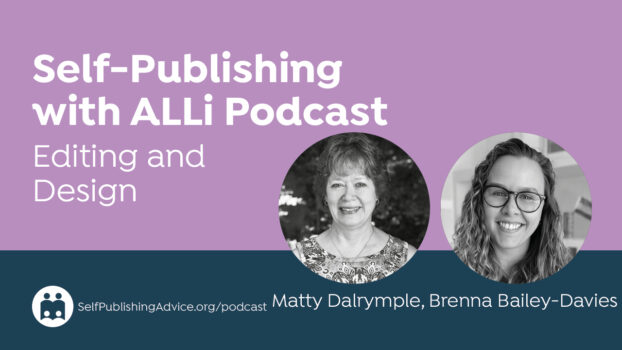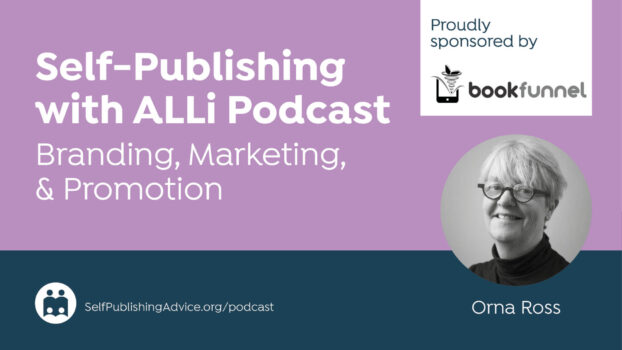As an independent author, you have the right to write for whoever you like, and one of the chief joys of self-publishing is that the choice is all yours. But is it smart to disregard your audience and write only for yourself, trusting to luck that there'll be some readers out there who'll share your tastes, or is the wiser move to gear your writing towards a specific audience? American indie author Samantha Warren makes a clear case for writing to suit your audience. Please join the conversation at the end via the comments box.
I’ve heard a lot of writing advice since I became an author. Some of it is good; some of it makes me raise an eyebrow. One thing I constantly hear is that you shouldn’t write for an audience. You should only write for yourself. Having been published for a few years with a handful of dedicated fans behind me, I strongly disagree.
The Evolution of the Author
In the beginning, yes, you need to write for yourself. Your first book, or books, are for you, to learn your voice, to discover if this is really what you want to do for the foreseeable future. But that all changes once you hit the Publish button. When you put your work out there and choose to make a living as a writer, your obligation is no longer just to yourself. Once people start to buy your books, like your work, and follow you, you owe it to them to take their opinions into account. They’re giving you the money they worked hard for, after all.
Over on the ALLi Facebook group, we recently had a discussion about this very matter. Someone said that writing is a solitary pursuit, and only the writer is involved. I disagreed, of course. I write for my readers. I listen when they speak.
Someone else chimed in with “Many of my readers have become friends and they earn me a living. But I don't write for them, I share my books with them. I've been badgered for sequels for 10 years,but I'll never do it. Readers want them, but I don't need to write them.”
What Do You Owe Your Audience?
Personally, I can’t comprehend that idea. When I’m down in the dumps, wondering if writing is truly the way I’m supposed to go with my life, I remember the random people who found my books and liked them so much that they actually follow my Facebook page and send me emails. That is why I write. For them.
Sure, I write the stories I want to read. And if someone asks me to write a mystery (they have), I say no, because it’s not something I’m in to. But when my readers mention an idea they’d like to see, or request sequel to a book I didn’t know had a sequel in it, I don’t say no. I think about it, and 9 times out of 10, I realize they’re right.
My readers know me. They know my books almost as well as I do. Honestly, some of them might know the books better.
I have one reader who has read my vampire series more times than I have. So when they ask, I listen. Because this is my job, and they are my customers. Because I’m an artist and they are my fans. Because without them, I wouldn’t be able to keep going.
Writing for an audience isn’t a bad thing. It’s the smart thing to do once you have a fan base, because they’re the ones who will support you in any endeavor you make. They’re the ones who will be there through thick and thin. They’re the ones who will have your back when no one else does. And they’re the ones who know what you’re capable of and will be willing to support you with their own money. They’re your lifeline. So don’t discount them or their opinions.
You need them as much as they need you.
OVER TO YOU
Who do you write for – your target audience, yourself or somewhere in between? What advice would you give to an aspiring author on who to bear in mind while writing? Please join our conversation via the comments box.
Who should authors write for - themselves or their readers? Join @_samanthawarren's debate Share on X






[…] Samantha Warren says, “My readers know me. They know my books almost as well as I do. Honestly, some of them might know the books better.” […]
[…] Writing for an Audience by Samantha Warren […]
[…] not about you, it’s about the value you’re delivery to your audience. Have your read “Writing for an Audience” by Samantha […]
It’s the day after the Fringe Meeting at Foyles (as a new member, the first I have attended). It was a great opportunity to put faces to names. But occasional comments really angered me. Still, I kept silent, because the events were being broadcast. This private forum is the place to quietly fume.
Surely, surely, surely we can do without the naive platitude from C J Lyons that “the reader is god”? Haven’t we advanced at all from such wide-eyed silliness?
Each writer places herself somewhere along a spectrum. The spectrum runs from hack (defined as a writer who writes solely to please her readers) to author (defined as someone who writes what she feels she has to write regardless whether anyone is ever going to read it). Probably the majority of writers sit somewhere in the middle, hoping to say something meaningful but also in a way that simultaneously attracts readers.
I sit firmly at the author end of the spectrum, and while I wouldn’t deny C J Lyons the right to be a hack and write fiction blatantly to please readers and sell copies (there are far worse ways to earn a living), I felt very angry when I heard her proclaim “the reader is god”, as if only her approach to writing and publication has validity.
Thank goodnes for Rachel Abbot (I think it was) who a few moments later said that the most important thing for each person setting out to be a writer is to define for herself exactly what will constitute success. Yes, yes, yes.
For me, the important thing is to influence through writing, not to entertain. Of course, people aren’t going to spend money to be lectured at, so we have to sugar-coat the pill with some jolly derring-do. We slip the message across to them within the entertainment, hopefully without them even noticing.
So to me, the reader is not god. Rather, readers are passengers on my train, which is going where I have chosen it to go, and, while I hope they enjoy the ride and get some satisfaction from the destination, I am not going to lose any sleep if a passenger completes the journey disgruntled. Sorry: no refunds.
My father, an author, died in 1995 aged 80. On 13 January this year we quietly celebrated his centenary. A few weeks later, as his heir I received a tiny payment from Public Lending Rights. One hundred years after his birth, a handful of people are still borrowing his books from their libraries.
That for me is success. Not the number of copies sold within weeks of publication, but the (much fewer) words that continue to be read after the author’s death. Never mind the width: feel the quality.
The Ancients believed that if you could name a man you had power over him. To me, writing is an attempt to name Death, the only true obsenity, and so gain a little power over him. To achieve even a brief touch of immortality, as my father has achieved, is to me success. So my ambition is to leave at least one footprint in the sand above the high-water mark. Probably, I will fail. But at least I am trying.
It would be so nice if people like C J Lyons stopped patronising us more ambitious authors with trite aphorisms and instead accepted that for very many of us the reader is not god but merely a passenger on the magical mystery tour we have generously staged not for their entertainment but for their erudition.
So, how do you bring in something to the world that is new when you only do what your audience wants?
There is no write answer to this question. There have been creative people that followed their own vision and were/are very successful. There are others that created for an audience. So, the question of whether you write for your audience or not is not a useful question. Actually, it misses the mark. I mean if both positions lead to success, it cannot be the position per se.
Some of the answer is luck, but that is hard to act on.
The answer is most likely in the dreaded “Q” word–quality. That does not mean we all have to write “Literature,” whatever that means, but that the work is fit for and resonates with a reader. That has nothing to do with your work being led by the reader–readers can actually like things they have no precedence of liking before. But unfortunately, the quality discussion is the hardest. It is the one we most avoid. Partly because we are afraid to look at it, partly because it is the most elusive to define–it is kind of like nailing jello.
And it is a tough topic. It is easier to say what it is not–it is not simply taste. Technical criteria, sometimes referred to as craft, is easier, partly because there is less subjectivity, partly because it is less personal. But mostly because it is such a personal journey. There are people that have gone before that can help, but, ultimately, it is the creative person that has to take the trip.
So, maybe the real question is how do you make this creative journey? How do you develop your craft. At the beginning, people can help. But there is a time when you need to take this solo, when you need to drive yourself. What are the mechanisms to allow for your own growth? When I find out, I will let you know–hopefully in a best selling book. 😉
I’m aware when I write that I’m putting a great deal of myself into the book – writing for me, if you like — but when I edit, I remove everything I can that reflects my own take on the world: my biases, I suppose you’d call them. I try to present characters and actions in a way that says, “I have no view on the morality or rationality of this – you decide”. I admire Simenon, who was known as “the man who isn’t there”, and what I think that means is that he presents the most appalling behaviour and you never actually know what he thinks about it. He leaves judgement to you. One thing I would add is that everyone is talking about the reader and the writer. What about the characters? Don’t you write for them? I do, because if I don’t there’s uproar in the little room I write in – Billy saying, “I would never say that. You’ve misrepresented me” and Sharon asking, “What kind of girl do you think I am?” (Well, Sharon, I really don’t think I want to answer that). But, yes, what the reader wants is important. That doesn’t mean pandering to them, though. Something ALLi members have seen me say before about one of my books: I wrote the last third with my mind on the reader and I was thinking, “You think you know where this is going. Don’t you? You think this is a standard Boy meets Girl/Boy loses Girl/Boy gets Girl back/Happy ever after story. Don’t you? Boy, do you have a shock coming”. So I’m writing for the reader – but that doesn’t necessarily mean giving her what she wants. (Her? Look, let’s face it, most readers are women).
Well … Useful stuff …I write what I believe in – but that doesn’t mean I write for myself, it means I don’t write crime, or erotica, because they are genres I don’t read. I have published 2 family-based novels which observe and comment on our society …My books are admired by those who read them, but I could do with a lot more readers. At present my daughter is trying to persuade me to write a more whacky themed book than I’ve done yet, and I know it may disturb some of the readers I have – but it may bring in a whole swathe of other ones .. sadly I suspect I need to tone down the science and tone up something else for the readers, whatever, since all too many readers seem to like reading about people who work at writing or art … and the scientists among us read … ?crime? … This is a serious comment – for example, my latest blogpost which includes some lovely facts on Hox genes and how they form the developing animal (including humans), woven into a story, has no comments at all …was it boring?????? Must I write about writers and people who work in advertising???
Clare, it sounds to me like you haven’t found your core audience yet. As I said in the post, I don’t write things like mystery or straight romance because those things don’t interest me. You still have to write things you want to write about, you just do it with the readers in mind, and only after you already have a core audience to give you feedback.
I am going to have to disagree with any concept that holds I “owe” my readers anything at all. I do not. There is wisdom in being sensitive to what my readers like and do not like, perhaps from the standpoint of style, but I am writing from the core of my being, not from sticking my finger into the air and getting a sense of what will or will not sell. I am persuaded that my writing has to be genuine, and whomever it resonates with, it resonates with. If I am disingenuous, it will resonate with no one, not even me.
I learned early on that I am unable to sell a product in which I do not believe, whether that product be a wind-shield wiper, a political viewpoint, or my thoughts in a manuscript. If I allow my audience to dictate my direction, then it is no longer my core, my thoughts, my beliefs, but theirs. Even as multiple editors crucified my manuscripts with their red ink, changing here and changing there, my wife decried their work and my acceptance of their criticisms saying, “If you allow them to alter your work in this way, the book is no longer you, it is no longer yours.” I disagreed, because the core message was still intact, and the work of the editors was excellent, but I understood my beloved wife’s concern, and I believe allowing my audience to dictate my direction will cause me to fall victim to exactly what she feared.
So, I will write those things about which I feel passionate and convicted. I will be guided by my principles because unlike preferences (mine or my readers’), principles apply all of the time.
This works if you actually *get* feedback like this from your readers. I get very, very little feedback of any kind from anyone, and not for lack of searching it out.
I have listened to this debate for a long time, too. I don’t think there is a right answer for an author. I believe the author provides the spark that creates the story and nurtures it into a live ember with her storytelling skills. After that, the readers are the oxygen that makes it turn into a fire that can toast a marshmallow, warm a house, or burn down a forest. Once an author has provided the spark and created the live ember, she may choose to be part of the oxygen, or not.
Yes, when I first started my indie author journey, I wrote what I wanted to write. Then I read a comment from a reader who bought my first ebook about the character’s story. So, from then on in my YA fantasy series, I have tried to put in more of the backstory to the character as to how they became angels and why they want other teenagers not to risk their lives. I will be putting more backstory in my next YA ebook, which is the last in the series.
I’m always trying to hit that sweet spot between what I want to work on and what readers will want to read. I am learning how to make myself want to write, however, which is probably me maturing as a writer. Finally. I currently straddle two, somewhat different genres in my writing. Interestingly enough, they are both selling at about the same rate, so working to hit both targets of readers is a bit challenging. But at the same time, lets me write in two genres that I love.
Which brings me back to (all roads seem to): this is an interesting business that will make you crazy if you let it.
The recent discussions on profanity and offensive language going on at ALLi facebook made me think of this. “Be true to yourself! Don’t let any fussy, prissy outmoded old stogies crimp your style!” seems to be the rallying cry of the majority.
It made me shake my head. It seems more skilled to manage both to have your characters do and say what they must to get the story across while still staying within the culturally ingrained language bounds of people who would otherwise like your story. A seasoned writer can do it, even if it takes a bit of extra work.
We are born with no instinct but to express and please ourselves. That’s an understandable place to begin. But as we grow and integrate into the social matrix, we learn to be considerate of the needs of others.
If we are writers, that means we may start with a back-slapping small group of other writers who tell us to keep creating however we want. A necessary step–but hazardous because it is not reader-centric and may send the new writer down a dead end–or maybe a very small alley. Going forward from there, we must learn to respond to a widening community not of our writer buddies, but of the specific fans who give our efforts their precious and irredeemable time.
I think that once you’ve had constructive feedback from people it does influence how you write.
I see writing as an enjoyable way to entertain people, including myself. I would always choose topics, or worlds to write about that I like or find interesting but above all I am trying to entertain the reader.
If you are writing and ignoring the reader/author business relationship, purely writing for yourself, then surely that does deserve to be called “vanity publishing”?
I look at ‘write for your readers’ in a different way. So many writers seem to think that they can afford to write dull, neutral prose, indulge in lengthy character histories which bear little on the present story before the story has even got going, luxuriate in the poetics of the settings they create, explain every last nook and cranny of their stories — just to be sure we understand, right? This is fine in a first draft when you write for yourself. However, as soon as you decide to revise that story, shape it up to something that is publishable, or near to, put it out for crit partners or friends to read, that’s when you have to take into consideration what will keep your reader interested.
So many writers seem to think that, well, I write what I want, it’s my story, but you can’t expect someone to labour through to the end just to pay lip service to you. I write the stories I want to write, with the characters I want to use, on the subjects I want to talk about, but in my revisions I am always looking for whether I have delivered each stage of my story in the most entertaining way for the reader that I can that also suits the style of the story I write. And I listen to my crit partners and take real consideration over their suggestions.
And yes, maybe you should listen to your readers when they ask for a sequel, if it means putting dinner on the table, but if you do it because other people want you to, and your heart is not in it, then it may well fail as a gripping read. It may also counteract your point and lose you readers, and a blossoming or established reputation. I suppose it depends on how much enthusiasm you attach to someone else’s idea, and how much you need the money. I’m sure many HP fans would have happily had JK Rowling writing her series years into the future, but it – and she, no doubt – would have become stale eventually. Sometimes, an author needs to move on for their own good. So, I think it depends on the idea, and what is being asked of the author.
One final point — Authors are creative people. I feel it is our job to bring in new ideas and angles on the world around us. Society often doesn’t know it wants something until it arrives so pandering to the type of books readers ask for runs a danger of letting the pool stagnate, because there are a lot of people out there who will happily consume the same types of story over and over again. Maybe the best approach is to mix it up?
In summary — write the stories you want to write, but write them with the reader’s enjoyment in mind, otherwise you truly are writing for yourself.
We author-publishers are essentially a small business and if we wish to succeed we need to give our customers what they want. I love to write, but know what my readers want and try and give them something they will enjoy and tell their friends about. I write mainly Regency romantic adventure and this is where my main sales are. However, I also write main stream historicals and, although these don’t sell as well, I will always publish one or two a year because they are what I want to write.
I agree, listen to your readers, but don’t jump on any band wagons and never write something you aren’t comfortable with just because adding sex/violence etc might sell more books.
That’s a good balance, Fenella. Kind of like the actors who do the chick flicks so they can do the indie films that don’t pay well, too.
I totally agree about not doing something that makes you uncomfortable. I tried to write an open-door romance. It didn’t work out well. I’m just not that kind of writer.
Great post! I think, as writers we have to write what we *want* to write, otherwise it just won’t work, but we also have to listen to our readers.
I have a…ahem…somewhat unique sense of humour. Well, it’s not totally unique because a lot of people find me funny – either that or a lot of people are very good at tactfully backing away from me at parties. So I rely on readers and editors to tell me when I’m actually *being funny* and when I’m writing self-indulgent stuff that makes me chuckle like a loon but that no other human being is ever going to understand.
After all, it’s all very well writing to please myself, but if nobody can understand a word I say… I’ve shot myself in the foot a bit, haven’t I?
I think you have struck a good balance, Samantha. I write to entertain myself first so, like you, I am never going to write in a genre in which I have little interest and trying to force it wouldn’t be productive for me. But I also consider myself to be an entertainer, rather than an author, so I am always thinking about what my audience might like and what might make them laugh. On my blog I have even written several long-term readers into blog posts and sketches because I know they’ll be entertained by it. I threw one male reader off a skyscraper wearing women’s clothes. He loved it:D Writing for yourself is a great and very satisfying but writing and entertaining other people and the personal satisfaction of knowing you have made someone happy or enriched their lives is even better.
Sounds like you have an awesome fan base, Jane! I’ve put several readers (or their ideas) into my books. It’s a fun way to thank them for being so awesome. 🙂
Great post, Samantha. I have a huge print out right above my monitor as I work that says “WHAT DOES THE READER WANT?”
Every time I look up it is there to remind me that whatever *I* want to write about, it’s the reader I have to keep in mind – all the time.
So yes, I agree. Learn your craft, indulge in wild experiments, and then remember who it is you’re really writing for.
Exactly, David. Writing starts for us, but if we want to make it a career, we need to think about those we’re writing for.